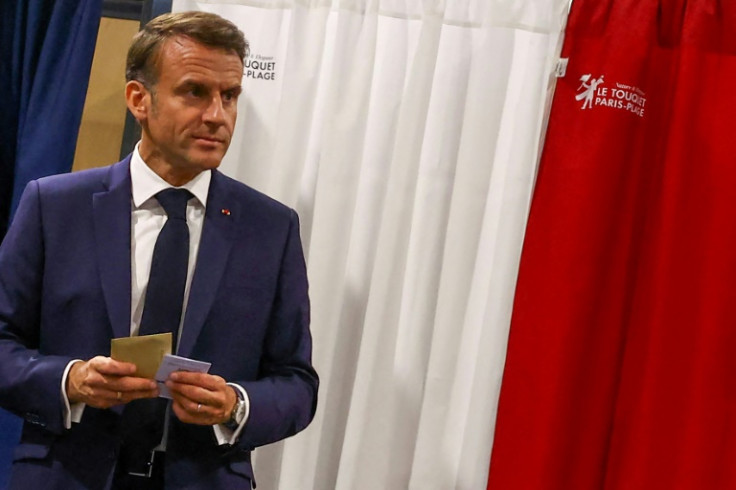
French President Emmanuel Macron was to face journalists' questions Tuesday after calling risky snap elections that could result in a far-right surge in parliament.
The ballot has set alarm bells ringing across Europe, risking hobbling France, historically a key player in brokering compromise in Brussels and support for Ukraine against Russian invasion.
With just 19 days until the first round on June 30 -- the shortest campaign since France's Fifth Republic was founded in 1958 -- Macron's task to shore up support in the rare grilling from journalists is formidable, according to polls.
A Harris Interactive-Toluna poll published Monday suggested just 19 percent of people would vote for his camp, compared with 34 percent for the far-right National Rally led by his two-time presidential challenger Marine Le Pen.
"It's the future of the French nation that's at stake in a few weeks," Macron's Finance Minister Bruno Le Maire told broadcaster BFMTV Tuesday.
"Either there's a clear majority, or we run the risk of a regime crisis," he added.
Macron called the snap polls after the far right crushed his centrist alliance in Sunday's EU ballot, in what analysts said is the French leader's bid to keep the far-right National Rally (RN) out of power when his second term ends in 2027.
On the economic front, ratings agency Moody's warned Monday that the election posed a risk to its evaluation of France's more than three-trillion-euro ($3.2 trillion) debt pile -- around 110 percent of GDP.
Le Pen was quick out of the gate with a TV interview late Monday, calling the vote a "historic chance for the nationalist camp to put France back on track".
She said her policy priorities were "defending purchasing power and fighting insecurity and immigration".
Le Pen added that the RN could decline to stand candidates against members of the diminished conservative Republicans party if they can strike an electoral deal.
Jordan Bardella -- her 28-year-old party chief -- would become prime minister if the RN comes out on top, Le Pen said.
Bardella said Tuesday that "there are people from the Republicans" who would enjoy RN backing at the polls -- although there was "no deal between the parties" so far.
The RN is also speaking to smaller far-right outfit Reconquest, led into the European elections by Le Pen's niece Marion Marechal.
France's fractious left-wing parties appeared to quickly set aside differences that had shattered their parliamentary alliance, with the last straw coming over the response to the Israel-Hamas war in Gaza.
Socialists, Greens, Communists and hard-left France Unbowed (LFI) said they would "support joint candidacies from the first round" of the elections -- the same strategy that gleaned them a total 151 seats in the 577-seat parliament in June 2022.
"We did it, we managed to reach a deal!" Greens chief Marine Tondelier told activists demonstrating outside the party chiefs' gathering at her Paris headquarters.
The left plans to join demonstrations against the far right planned for this weekend by major trade union federations including the CFDT and CGT.
But the alliance has yet to name a consensus candidate for prime minister if they gets most seats.
Raphael Glucksmann, who led the Socialists close to neck-and-neck with Macron's Renaissance at the European poll, has ruled out serving.
Party leaders are also reluctant to elevate LFI's abrasive leader Jean-Luc Melenchon.
Whatever the decision about leadership, parties across the spectrum are in an organisational scramble to get their candidates' names to election authorities by 6:00 pm on Sunday, before the official start of campaigning next week.






